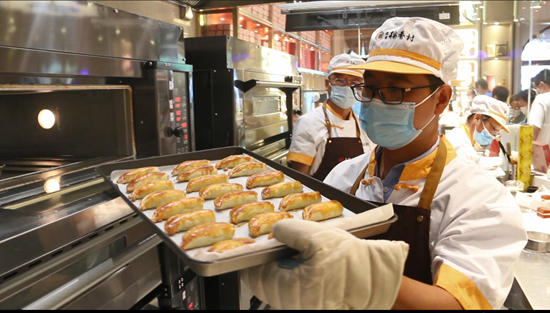Chinese time-honored brands find new ways to rejuvenate business for multiple generations of consumers
“It will take about half an hour,” a manager said, preparing customers for the long wait as they snaked slowly in batches into a newly-opened Beijing Daoxiangcun store.
The outlet is situated at the same location where the time-honored food brand resumed operations back in 1984 at Dongsibei Street in Beijing. It was named “store zero,” a place to begin afresh with surprising new products.

A staff member of Daoxiangcun, a time-honored food brand, takes freshly baked pastries out of an oven at the brand’s new store situated at its original founding address. (Photo courtesy of the interviewee)
“When our store opened in late August, some customers queued up for two hours for our pastries,” said the store manager Rao Fengqin, revealing that the brand has won growing popularity among customers.
“After entering our store, young customers will take photos while senior residents living in nearby neighborhoods will also have a look around,” Rao said, explaining that a wall that features the brand’s culture and some unique ornaments can only be found at the “store zero” location.
In order to reach out to the next generation of customers, Beijing Daoxiangcun entrusted the interior design of the “store zero” outlet to a young team led by Li Weiqi, chief creative officer of a Beijing-based company.
“We selected the most representative elements of the brand with a history of over 100 years and redesigned them to attract younger generations, who are fond of an immersive experience and value innovation,” Li said.
Like Daoxiangcun, Beibingyang, a traditional soft drink brand based in the city, also opened a store situated at the address of its predecessor’s founding location, an ice-making factory built in 1936. The store, which despite being located along a narrow traditional hutong alleyway that allows only one-way traffic, has attracted numerous young people and nearby residents.
By opening new stores based on their original founding address, time-honored brands are aiming to create a scenario whereby consumers will link the past with the present, said Shen Ye, head of a research team on time-honored brands from the Institute of Cultural Economy at Tsinghua University.
In this way, China’s time-honored brands, including Daoxiangcun, aim to utilize “nostalgia” and social interactions to restore their former glory.
Shen noted that the Daoxiangcun stores are also where consumers, especially local residents, will be able to enjoy social interactions with one another.
Shen’s view was echoed by Cao Siyuan, a woman born in the 1990s in Beijing who also serves as a project manager for Daoxiangcun’s “store zero” outlet. Cao pointed out that her childhood memories about the brand are closely connected to past life experiences, including times when relatives would visit each other during the Spring Festival while enjoying some of the brand’s pastries and chatting away merrily.
So far, Cao and her team have launched 24 different kinds of freshly baked pastries and drinks, including traditional pastries, along with new products inspired by themes revolving around Chinese chess, Beijing hutongs, and Peking opera, as well as Beijing-style milk tea.
“For most of our products, we draw inspiration from the city’s culture and residents’ own living habits. Daoxiangcun, as a part of the city’s culture, has attracted all age groups, including both youth and the elderly,” Cao said, adding that the opening of the “store zero” outlet was not meant to cater to a specific age group but instead aimed to continue fostering connections with and between consumers.
To some extent, continuing to build emotional links with customers and preserve memories is what distinguishes time-honored brands from new and emerging brands, said Shen Ye.
Meanwhile, continuous innovation is the key to the rejuvenation of China’s time-honored brands, Shen said. For example, the “store zero” outlet under the Daoxiaocun brand has launched new products, and Beijingyang has meanwhile rolled out new drinks alongside other cultural and innovative products.
Shen suggested that time-honored brands should seek to develop innovative products, services and business forms that truly represent their brand’s unique culture.
There are currently 1,128 time-honored brands that have obtained official recognition from China’s Ministry of Commerce. According to the ministry, 84 percent of these brands realized profits in 2019, and about 75 percent managed to make profits in 2020, despite the negative impacts brought by the COVID-19 outbreak.
Photos
Related Stories
Copyright © 2021 People's Daily Online. All Rights Reserved.










